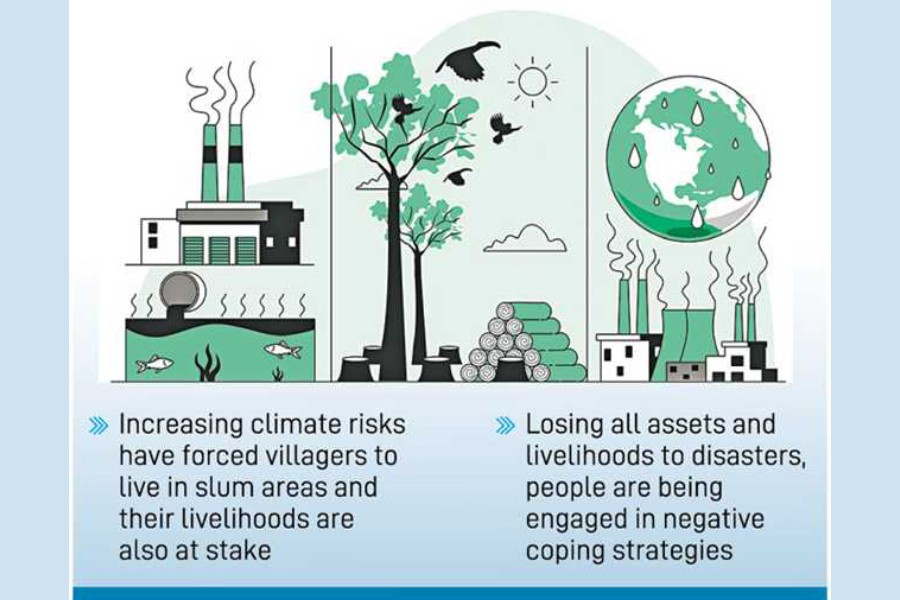A good number of climate victims are currently suffering from economic and health vulnerabilities as they received little financial assistance and inadequate policy support from the government to face climate change impacts.
Due to increasing climatic vulnerabilities, some villagers are now living in different slum areas such as Satkhira municipality and they are facing the risks of livelihoods as well.
Suffering loss of all assets and livelihood due to the disaster, people are being engaged in negative coping strategies such as reducing their daily meal intake to survive.
Keeping this phenomenon in view, stakeholders and experts said such a situation will also frustrate the country's attainment of the sustainable development goals (SDGs) and undermine poverty eradication and progress made on food security.
During a recent visit, this correspondent witnessed a bleak picture of the climate-affected people in Sadar upazila of Satkhira district.
The visit was facilitated by Center for Participatory Research and Development (CPRD).
The country may suffer total US$ 121 billion worth of losses and damage due to climate change impacts in forty-five years- from 2005 to 2050, which is equivalent to around 5 per cent of the country's Gross Domestic Product (GDP), - asses a study.
On October 29, 2018, the study findings were presented at a function organised jointly by bActionAid Bangladesh and Ministry of Disaster Management and Relief.
Thirty-eight-year-old Abu Syed, who is also a climate victim at Par-Maskhola village, Satkhira Sadar, said he was involved in shrimp farming but he is currently running a grocery shop.
His shrimp farm was washed away during Cyclone Aila causing him a heavy financial loss, he told the FE.
Not only that, he lost different types of crops including paddy during different cyclones including Amphan but never got support from government and any development organisation, he furthered.
After that he was never involved with such farming due to such a disaster, Abu, who has a four-member family, said.
However, there is no salinity problem in his area, he added.
During different cyclones, some 20 per cent to 30 per cent people suffered diarrhea-related complications, Syed added.
Bazlur Rahman( 35), a grocery shop owner, Shamsul Mahbub ( 60), a local businessman, and Abdul Latif ( 67), who takes care of a local cyclone centre during different calamities, made appeal for adequate policy support and echoed almost same hurdles they faced during different cyclone-related disasters.
Talking to The Financial Express, Professor of the Chemistry Department at Dhaka University Abdus Salam said the government should extend its support to the climate affected people to mitigate their sufferings through accommodation.
The climate victims are being affected for not their own fault rather they are facing different hurdles including economic and health due to global reasons, he said.
He also stressed the need for strengthening the local government system to provide the support smoothly to the climate affected areas.
Professor Salam also underscored the need for direct cash and technology support to the people to improve their livelihoods.
Md Shamsuddoha, Chief Executive of CPRD, said the government should identify the problems and vulnerabilities of local people, who are facing adaptation problems there, mostly in climate-disaster areas.
After identification of the facts and figures, it should frame a proper and effective policy to end their persistent human sufferings in line with global standard, he opined.
Admitting the pain and pangs of the people in the areas, Shamsuddoha put emphasis on building rehabilitation programmes including livelihood development to halt the internal migration problem which is one of the major concerns among the climate victims.
The government should address and keep the migration issue as its core plan, he added.
Admitting all types of suffering including economic, health and food security in the area are not declining, Dr Abdullah Harun Chowdhury, professor, Environmental Science Discipline, Khulna University, said saline waters in the areas are destroying the local farming alongside food security.
Unplanned shrimp cultivation is also hurting its potentiality as well as export earning, he told the FE.
The government's support in the area is inadequate compared to the population density, Harun said.
Citing a new study conducted in Gabura, Paddapukur and Burigoalini unions of Shyamnagar upazila of Satkhira , he said the recurrent climate-induced national hazards are increasing every year and most of the agricultural lands are converted for shrimp farming.
The shrimp farming is also destroying the local embankment, he said, adding some 5.0- 10 per cent of people in the area facing climate-related disasters are migrating for better living to different places of the country every year.
About 10-12 per cent of children are being employed in heavy work like brick kilns every year, he said.
Around 10 to 20 per cent children are deprived of education every year, he said, adding 10 to 15 per cent of women in the area are suffering from uterus-related diseases.
The adolescent girls are taking birth control pills to stop the menstruation destroying their reproduction capacity thus creating social anarchy in the long run, Dr Abdullah added.


